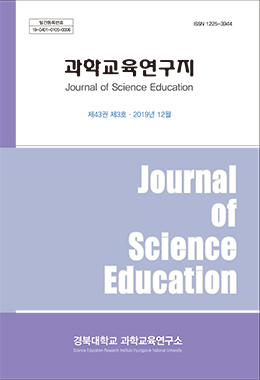이 연구의 목적은 초등 과학 수업에서 절차적 사고 과정을 사용하여 학생들의 컴퓨팅적 사고와 창의적 문제해결 능력에 대한 교수 전략의 효과를 알아보는 것이다. 이를 위해 과학수업에서 활용할 수 있는 절차적 사고 과정을 이용한 수업 전략이 개발하여 적용하였다. 이 연구의 대상은 김포시에 있는 S 초등학교의 실험반(29 명)과 비교반(29 명)의 6학년 학생이었다. 연구 결과는 다음과 같다. 첫째, 초등과학 수업에서 절차적 사고과정의 수업전략을 활용한 실험반 학생들의 컴퓨팅 사고력은 비교반 학생들에 비해 높아졌으나 통계적으로 유의한 차이가 없었다. 둘째, 실험반 학생들의 창의적 문제 해결력에 있어서도 비교반 학생보다 높게 향상되었고 이는 통계적으로 유의한 차이가 있음을 알 수 있었다(p < .05).
The purpose of this study is to investigate the effects of instructional strategies using the process of procedural thinking in elementary science classes on students’ computational thinking and creative problem solving ability. For this purpose, instructional strategies using the process of procedural thinking for science class were developed and applied. The objects of this study were 6th graders from an experimental class (29 students) and a comparative class (29 students) at S elementary school in Gimpo City. The results of the study are as follows: First, as a result of examining the difference in the computational thinking ability between experimental group and comparative group, the experimental group scored higher than the comparative group, but there was no statistically significant difference. Second, the creative problem solving ability of the experimental group after applying this program was higher, and statistically significant differences were observed (p < .05).




